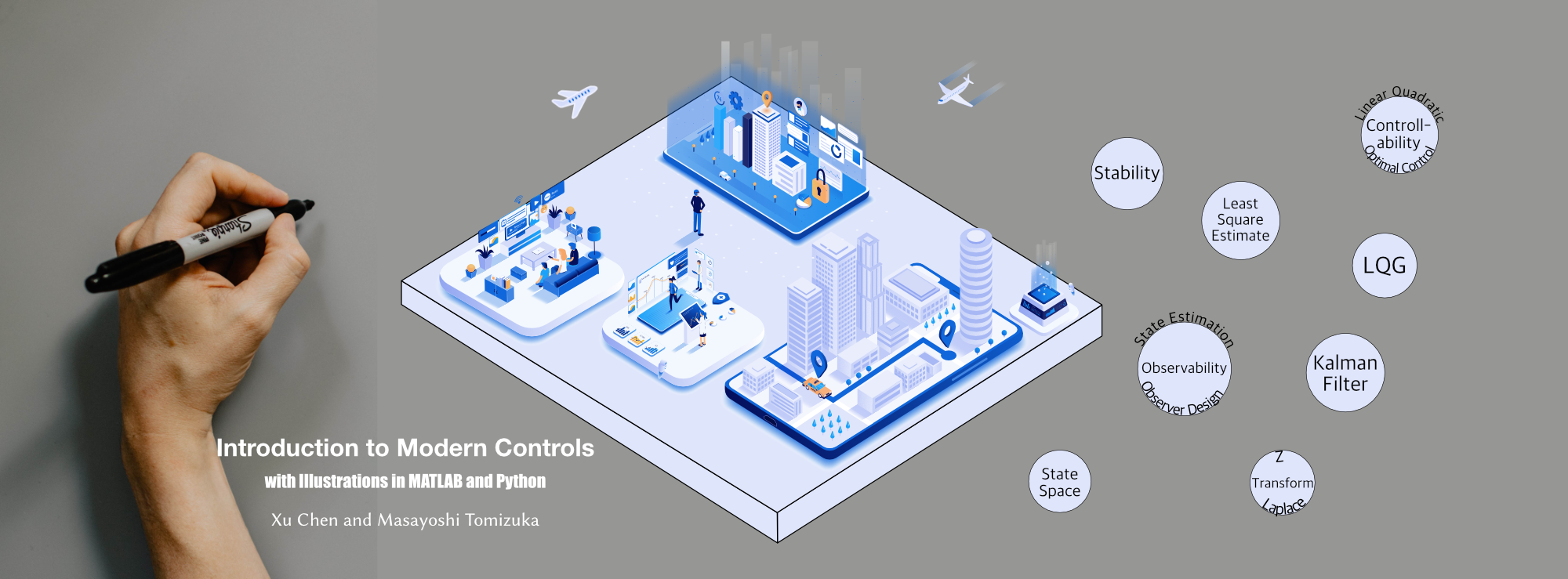
“Introduction to Modern Controls“ uses modern computing tools such as MATLAB and Python to teach modern control systems. You will learn how to use state-space methods to make, study, and control dynamic systems. You will explore topics like state-space models and solutions, stability, controllability, observability, state-feedback control, optimal control, observers, observer state feedback controls, least square estimation, Kalman filter, and Linear Quadratic Gaussian optimal control. You will see how these topics work in both continuous- and discrete-time settings. Substantial example codes, figures, and illustrations on physical systems supplement your learning.
About the Authors
Xu Chen is an Associate Professor and holds the Bryan T. McMinn Endowed Research Professorship of Mechanical Engineering at the University of Washington, Seattle. He obtained his Ph.D. degree in mechanical engineering from the University of California, Berkeley in 2013, and his bachelor’s degree in mechanical engineering from Tsinghua University, China in 2008. He researches into dynamic systems, controls, and information processing, to better understand and engineer smart manufacturing that can positively impact our lives. Xu Chen’s work has led to Best Paper Awards, servo algorithms in mass production in the information storage industry, and top-tier adaptive control methods in international benchmark evaluations. He is a recipient of the U.S. National Science Foundation CAREER Award, the SME Sandra L. Bouckley Outstanding Young Manufacturing Engineer Award, the Mechatronic Systems Outstanding Young Researcher Award from the International Federation of Automatic Control (IFAC) Technical Committee on Mechatronic Systems, the Young Investigator Award from ISCIE / ASME International Symposium on Flexible Automation, and the inaugural UTC Institute for Advanced Systems Engineering Breakthrough Award. At the University of Washington, he currently serves as the Director of the Boeing Advanced Research and Collaboration Center.
Masayoshi Tomizuka received his Ph. D. degree in Mechanical Engineering from the Massachusetts Institute of Technology in February 1974. In 1974, he joined the faculty of the Department of Mechanical Engineering at the University of California at Berkeley, where he currently holds the Cheryl and John Neerhout, Jr., Distinguished Professorship Chair and serves as Associate Dean for the Faculty in the College of Engineering. His current research interests are optimal and adaptive control, digital control, motion control, and control problems related to robotics and manufacturing, vehicles and mechatronic systems. He served as Program Director of the Dynamic Systems and Control Program of the National Science Foundation (2002-2004). He has supervised about 130 Ph. D. students to completion. He served as President of the American Automatic Control Council (AACC) (1998-99). He is Honorary Member of the ASME, Life Fellow IEEE, and Fellow of IFAC and the Society of Manufacturing Engineers (SME). He is the recipient of the J-DSMC Best Paper Award (1995, 2010), the DSCD Outstanding Investigator Award (1996), the Charles Russ Richards Memorial Award (ASME, 1997), the Rufus Oldenburger Medal (ASME, 2002), the John R. Ragazzini Award (AACC, 2006), the Richard Bellman Control Heritage Award (AACC, 2018), the Honda Medal (ASME, 2019) and the Nichols Medal (IFAC, 2020). He is a member of the U.S. National Academy of Engineering.